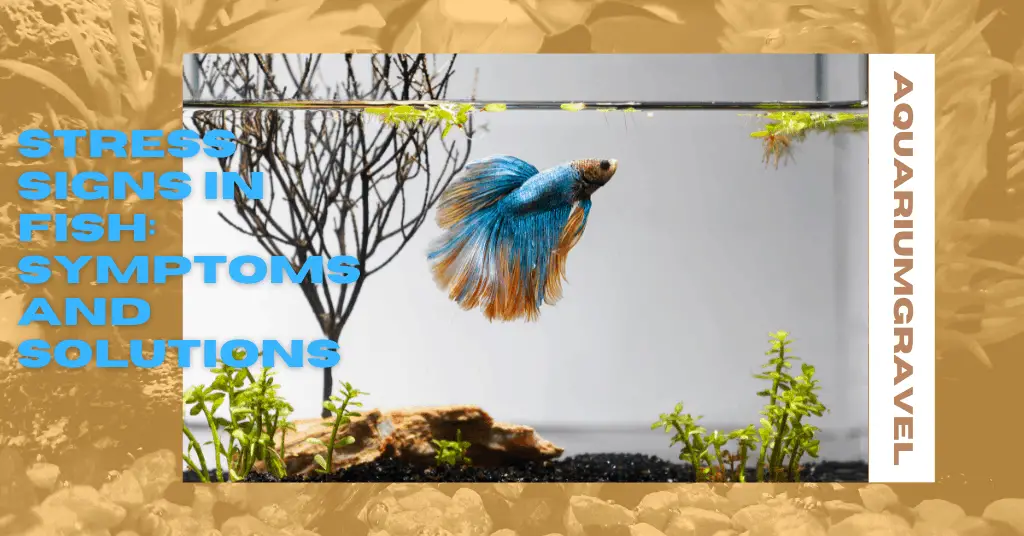Last Updated on July 4, 2021 by cmoarz

How to tell if your fish is stressed
Table of Contents
When fish are stressed out, the symptoms can be pretty blatant. iridic and strange swimming patterns (loop de loops, zigzagging) going up for air at the surface, running to the substrate, rubbing the sides of the tank or rocks, and strange fin behavior are all attributed to stress.
Some other symptoms include:
- overturned stones in the tank
- urination of blood
- dead or dying fish
- uneven growth on the scales.
Diagnosing that a fish is stressed is the easy part. The hard part is figuring out what caused it, and how to fix it.
Different Causes of Stress in Fish
There are a variety of reasons a fish can become stressed, and many of them are very easy to avoid or fix. Let’s get into it.
Fish bullying can cause stress
Fish bullying generally occurs when there are too many fish in the tank or too few hiding places. It can also happen when new fish are introduced to the tank or when too many males or females of the same species are in the tank during spawning season.
Some fish are just known to be aggressive and make bad tank mates. You should check to be sure all the fish in your aquarium are compatible species that will get along, If not, bullying is a possible cause of stress. Consider either adding more hiding spaces or removing some of the aggressive species.
Stress can be caused by overcrowding
When overcrowding is a problem, fish will often exhibit symptoms such as erratic swimming patterns and darting to the surface for air. They will even turn on their own kind in an attempt to gain territory. This can result in injuries, illnesses, and even death if it’s not addressed quickly. Try moving them out of the overcrowded tank into a temporary holding container or quarantine station and providing them with more space.
Parasites can cause stress
Many parasites will impact how your fish behaves, so it’s possible that your stress was caused by an infestation of ich (white spots on fins), anchor worm (fleshy protrusions around the mouth), or even a bacteria (cloudy water).
It can be difficult to identify what type of parasite is present, but if you suspect one might be the culprit, consult your local aquarium store. They will have treatments for specific parasites on hand that work best in certain situations and environments.
Bacterial infections can cause stress
If you notice cloudy water, poor breathing, or no reaction at all when you put your hand in the tank (fish won’t flee) then a bacterial infection might be to blame. Bad bacteria can kill fish very quickly and make them stressed out by preventing them from doing things they normally would like eating for instance. If it’s not treated, this will only lead to more problems.
Water parameters can cause stress
If the pH level is off, or if there are too many toxins in the water (nitrates and ammonia), or you’re temperature is fluctuating (such as after a water change) your fish will experience a lot of stress. This is especially important if there are multiple problems in the tank such as bad water parameters and illness and/or bullying.
Trying to deal with both an unfriendly environment and their own illness at the same time is a massive stressor. This high degree of stress has been known to make fish extremely susceptible to illness, and can even lead to death.
If you suspect that water parameters are the problem, then try improving how often you do water changes (more than once a week). Also, check to make sure your filter isn’t clogged up and underperforming, Or that you have a filter strong enough for your tank size.
Remember to test often. Test kits are cheap and widely available so you shouldn’t worry about doing it too often.
How do you calm a stressed fish?
Different Methods to Calm a Stressed out Fish
A fish can become stressed for many reasons, but there are several ways you can try and calm them down. Stress is never good for the well-being of an animal. If it’s left untreated, stress will worsen their symptoms or even cause death in extreme cases.
One way to help ease a fish’s mind is by placing it in a comfortable tank with plenty of hiding places. This helps reduce any feelings of overcrowding and bullying that may have caused the problem in the first place.
Another method for helping your water creature feel better is by adding live plants to their environment as they offer shade from bright lights and provide another form of shelter when needed (along with other benefits).
making sure your water parameters are perfect will also help your fish feel better. If they’re not, then it’s important to address how you can improve them before the problem worsens or becomes more fatal.
Can a stressed fish recover?
Absolutely! As long as you take care of the stress that has caused your fish’s symptoms, then they should recover in no time.
Most fish are quite resilient and should bounce back if you play your cards right. Once the stressors are eliminated, they should feel much better in no time!
How long are new fish stressed?
It is recommended to avoid putting a fish in a new environment for at least three days. This will allow the fish to get comfortable and adjust to their surroundings before being put in any stressful situations.
The first few days in a new tank are crucial for the fish’s survival.
Once you have introduced your new fish to their new aquarium, you must provide an environment that is safe and comfortable for them.
If they are stressed or fearful during this period, it will increase the chances of them dying prematurely or becoming ill.
One way to prevent this is by providing a hiding place within the tank. This can be accomplished by adding plants and aquatic decor that provide hiding places within their environment.
It’s also important to drip acclimate your fish for several hours (up to 12 hours or more) with your aquarium water before adding them to their new tank. Doing this can help prevent stress that may arise from sudden changes in water chemistry, temperature, and other factors.
Assuming you’ve done all this correctly, A new fish should only remain stressed for a day or 2 before being right at home.
About
Owner of AquariumGravel.com and also owner of actual Aquarium Gravel believe it or not! ;). Setting up beautiful aquarium sceneries and habitats since I was very young. Enjoy!
- Web |
- More Posts(290)

